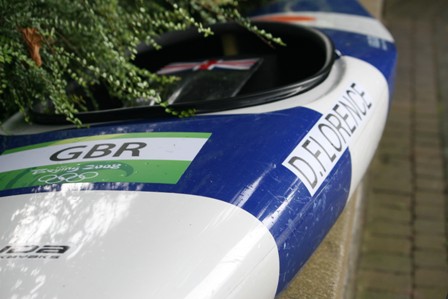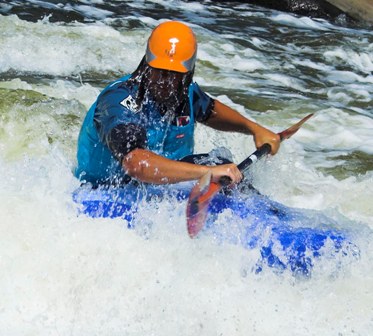
Getting on the water can be difficult
Open water: battled at source
When Mick Owen travelled to Llangollen to cover canoeing’s British Open for November’s is of The Leisure Review he stumbled on a controversy that shows just how vexed the question of ‘access’ can be.

Getting on the water can be difficult
There is an old music hall song that goes “There’s an old mill by the stream. Nellie Dean. Where we used to sit and dream, Nellie Dean”, which conjures up idyllic visions of riverside tranquillity. At Mile End Mill on the banks of the River Dee in North Wales there has been precious little tranquillity recently as a dispute about who does or does not own the river have dragged in the UK canoeing community, the Crown Prosecution Service and the Welsh Canoe Association.
This particular saga is complex, controversial and ultimately unedifying but if you prefer your stories delivered by The Sun it went something like this. In June a naïve, young member of Shrewsbury Canoe Club was blithely paddling down the Welsh Dee on Llangollen’s Town Falls when at the behest of local rafting company bosses he was arrested and charged with using someone else’s piece of river without paying. Refusing to be intimidated by ‘The Man’, the paddler insisted that nobody could own the water in a river and that he was henceforth to be mentioned in the same breath as Rob Roy, Che Guevara and James Dean (qv Rebel without a Cause). In August the forces of darkness were routed by a Crown Prosecution Service decision that the case should be dropped and the canoeist paddled off into the sunset without a stain on his character.
Unfortunately space and patience preclude an attempt to be more measured; any interested parties can access news stories and endless forums on the internet. The salutary point is that this was a dispute about access to a natural resource – the water in the Dee which at a particular point where it is acted upon by gravity, geology, meteorology and even mankind produces a set of parameters that are attractive to canoeists, their close commercial cousins, rafters, and even their slightly unhinged colleagues, wild swimmers. In this the Town Falls are not unique. Indeed there are more than 300 rivers in Wales that people want to paddle, raft or swim down. But they can not do so with a clear conscience as nobody seems to know who owns the right of access. In most cases – and indeed in this case – we know who legally owns the riverbank, the riverbed and what are called ‘the riparian rights’. Usually it is fishing clubs or blokes in tweed whose great, great granddads once got on the right side of some king or other and as long has there has been a Welsh Canoe Association (WCA) – since 1976 – canoeists have accepted the riparian owner’s right to control access to ‘their water’. Until last October.
This is where it actually gets interesting to people beyond the parochial bounds of Llangollen town because what the WCA did in October 2007 set aside decades – and arguably generations – of knee-bending to an unproved and unjustifiable claim to ownership of Wales’ natural resources. To quote their chair Phil Blain, “We have in the past attempted to do our best to make the right of access easier for our membership and the wider paddling fraternity but in all my years of involvement we have not made satisfactory progress.” Indeed, after years of negotiation, conciliation and increasingly ineffective attempts to police hard-won agreements, the WCA were unable to guarantee that individual riparian owners would honour any of the access agreements they had managed to negotiate (11 out of a possible 310 in 2003). And yet the same group of owners would still blithely expect the governing body to bring to book anybody, member or not, who broke them.
When devolution brought the decision-makers closer, the NGB tested whether something as radical – or, possibly, sensible – as Scotland’s Land Reform Act, which enshrines responsible access to water, could be achieved in Wales. But when asked to rule on a test case the Assembly could not “provide a definitive statement”. Asked the same question, the Environment Agency (Wales) thought there might be a right of access but advised that it was a matter for the courts.
And in a quietly revolutionary way that is the tack being adopted by the WCA. It is now their policy not to know whether canoeists have the right to paddle down a river. If they do not know whether access agreements are necessary they see no point in negotiating them and absolutely no point in trying to enforce them on the hugely diverse community within canoeing. As Ashley Charlwood, their erudite and measured access development officer, says: “The new approach of the WCA is not ignoring the issue, only recognising that we, or anyone else, do not have the mandate to restrict the public without a law. Without rights and responsibilities there is much work to be done negotiating events, reinforcing facility or educating paddlers and others.”
Taking the stance they did was clearly not an easy decision and has brought opprobrium principally from the angling lobby. The Salmon and Trout Association, which numbers among its activists the Earl of Inchcape and Lord Moran KCMG, is a generally moderate and urbane organisation but even they are exercised enough to allow this outburst on their website: “S&TA continues to lobby hard for voluntary joint access agreements for water users, rather than a blanket right for any one sport to run roughshod over riparian rights.” And they add ominously that this is “a view for which the Government has since confirmed its strong support”.
Clearly somebody in the legislatures of both Wales and England needs to grasp this particular nettle as nobody is happy with the situation as it stands. As people look for more opportunities to enjoy the outdoors, transport options bring the wild areas of Britain closer to the urban dweller and kit is developed that extends their options so pressure will grow on the natural resource. Old arrangements will no longer serve and the WCA’s recent move is intended to be positive. “Legislation would bring more work, not less, for the WCA,” says Charlwood, “but it would also give those that enjoy being around water a voice and representation. If there is ever a positive enshrinement of a presumption in favour of access in Wales, then we can work effectively to protect interests, private, public, commercial and competitive to the benefit of everyone, not just the exclusive few.” He adds: “We don’t have a prescriptive solution, and we can’t dictate how individuals choose to enjoy their leisure time. We do however recognise that there is more to gain from a co-operative and egalitarian approach than the obstructive and elitist one that has
prevailed for too long. At the moment, and I hope for years to come, canoeing is not and will not be a crime.”
Mick Owen in managing editor of The Leisure Review.
For a full explanation of the thought processes behind the WCA policy, readers are directed to www.kayakingisnotacrime.org.ukf
The Leisure Review, December 2008
© Copyright of all material on this site is retained by The Leisure Review or the individual contributors where stated. Contact The Leisure Review for details.
